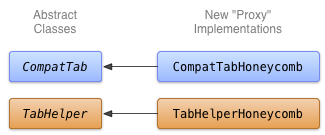代理至新的APIs
編寫: spencer198711 - 原文:http://developer.android.com/training/backward-compatible-ui/new-implementation.html
這一課展示瞭如何編寫CompatTab和TabHelper等抽象類的子類,並且使用了較新的APIs。你的應用可以在支持這些新的APIs的平臺版本的設備上使用這種實現方式。
使用較新的APIs實現Tabs
CompatTab和TabHelper抽象類的具體子類是一種代理實現,它們使用了使用較新的APIs。由於抽象類在之前的課程中定義並且是對新APIs接口(類結構、方法簽名等等)的鏡像,使用新APIs的具體子類只是簡單的代理方法調用和方法調用的結果。
你可以在這些具體子類中直接使用較新的APIs,由於使用延遲類加載的方式,在早期版本的設備上並不會發生崩潰現象。這些類在首次次被訪問(實例化類對象或者訪問類的靜態屬性或靜態方法)的時候才會去加載並初始化。因此,只要你不在Honeycomb之前的設備上實例化Honeycomb相關的實現,dalvik虛擬機都不會拋出VerifyError異常。
對於本實現,一個比較好的命名約定是把具體子類需要的API等級或者版本名字附加在APIs接口的後邊。例如,本地tab實現可以由CompatTabHoneycomb和abHelperHoneycomb這兩個類提供,名字後面附加Honeycomb是由於它們都依賴於Android 3.0(API等級11)之後版本的APIs。
- 圖1. Honeycomb上tabs實現的類關係圖.
實現CompatTabHoneycomb
CompatTabHoneycomb是CompatTab抽象類的具體實現並用來引用單獨的tabs。CompatTabHoneycomb只是簡單的代理ActionBar.Tab對象的方法調用。 開始使用ActionBar.Tab的APIs實現CompatTabHoneycomb:
public class CompatTabHoneycomb extends CompatTab {
// The native tab object that this CompatTab acts as a proxy for.
ActionBar.Tab mTab;
...
protected CompatTabHoneycomb(FragmentActivity activity, String tag) {
...
// Proxy to new ActionBar.newTab API
mTab = activity.getActionBar().newTab();
}
public CompatTab setText(int resId) {
// Proxy to new ActionBar.Tab.setText API
mTab.setText(resId);
return this;
}
...
// Do the same for other properties (icon, callback, etc.)
}
實現TabHelperHoneycomb
TabHelperHoneycomb是TabHelper抽象類的具體實現,TabHelperHoneycomb代理方法調用到ActionBar對象,而這個ActionBar對象是從包含他的Activity中獲取的。
實現TabHelperHoneycomb,代理其方法調用到ActionBar的API:
public class TabHelperHoneycomb extends TabHelper {
ActionBar mActionBar;
...
protected void setUp() {
if (mActionBar == null) {
mActionBar = mActivity.getActionBar();
mActionBar.setNavigationMode(
ActionBar.NAVIGATION_MODE_TABS);
}
}
public void addTab(CompatTab tab) {
...
// Tab is a CompatTabHoneycomb instance, so its
// native tab object is an ActionBar.Tab.
mActionBar.addTab((ActionBar.Tab) tab.getTab());
}
// The other important method, newTab() is part of
// the base implementation.
}
